Prison
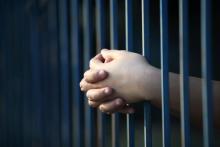
While they told Moses that, “All the words that the Lord has spoken we will do” (Exodus 24:3), in the end they turned to idols and broke God’s laws. By the time we get to First Samuel, we hear the people clamoring for an earthly king so they could be like other nations (1 Samuel 8:4-22). They thought life would be better if they shook up their system of government, so they ditched the judges and looked for an outsider. In the end, they got exactly what they asked for – a king named Saul who was wicked and moody and paranoid.
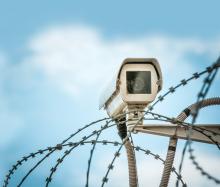
How could I not? How could I benefit from the messed-up grace of God that allows me to be seen by God on high not as a horrible sinner full and capable of every last deadly sin but as a beloved child and not see others differently myself? It’s messed up, but it’s true.
It’s impossible to laugh, pray, and sing old gospel songs with men who’ve raped and murdered, who’ve sold drugs to children, carjacked strangers, shot girlfriends, buried bodies in woods and not see grace.
I could not look at lines of incarcerated men, ready for a day’s work under the gun (literally), and not shudder at past (and sometimes present) atrocities and injustices. And yet, I could only hope for redemption for this land that no longer grows cotton and for these men who no longer have freedom.
And there’s no way I could rub puppies’ tummies while talking to an inmate-cowboy about dogs, to hear him tell me lots of guys here are like pit bulls because they think they’re tough, but that those guys don’t know—“They’re just silly snuggle bugs,” he says—and me not feel the peace of Christ descend.
I don’t know why. I don’t know how. I just know it’s true: When we visit prisoners, we visit Christ. All during my time in Angola, I saw Jesus everywhere.

IN MY HUMAN development class recently, the instructor showed a documentary about a 13-year-old girl with the pseudonym Genie. Her parents kept her in isolation for most of her life, until a social worker discovered her. Genie was kept in a room, tied to a chair, with virtually no human contact. She was “uncivilized” and could barely walk or talk. While my classmates gasped in horror at the video, I found myself relating to her.
I had been incarcerated in a California juvenile hall for four-and-a-half years. Roughly two months of that time was spent in solitary confinement—the longest stretch was six weeks. Like Genie, I was isolated in a room for 23 to 24 hours a day.
My classmates thought that Genie’s parents were “monsters” and “horrible” people. I wondered how many of them knew that we live in a country where youth and adults are commonly put in similar conditions for months or even years.
Today about 100,000 people—including thousands of youth—are held in solitary confinement housing units in juvenile facilities and adult jails and prisons across the United States. Systems use solitary confinement, or isolation, to keep individuals safe from themselves or others and for punishment. Solitary confinement has been linked to depression, anti-social behavior, anxiety, psychological damage, and self-harm. We now understand that solitary confinement does not keep us safe and does more harm than good, especially to youth who are still developing, physically and mentally.

ON THE SUNNY Monday before Easter 2015, roughly 60 people, some wearing clerical collars, gathered in front of Key Arena in Seattle. “Build futures, not cages,” one sign read. “Love youth/build hope/invest in futures,” read another.
The timing of this protest against a proposed new youth jail in Seattle’s Central District was no accident: Activists had dubbed it Holy Table-Turning Monday, a commemoration of Jesus flipping over the tables of money changers in the temple square in Jerusalem.
The group, a mix of church people — Methodist, United Church of Christ, Presbyterian, and others — and organizers from Youth Undoing Institutional Racism (YUIR) and Ending the Prison Industrial Complex (EPIC), crossed the street and entered the lobby of a building housing the offices of Howard S. Wright, the contractor hired to construct the proposed detention center. An uneasy PR man walked out from the glass-walled offices and chatted with a pastor in a purple stole.
Meanwhile, members of the group set up a card table and laid a purple tablecloth on it. They piled it high with nickels, symbolizing the 30 pieces of silver Judas received in exchange for his betrayal of Jesus, and cards with hand-written messages. “Change agent,” one said. “Be accountable to our history and dismantle the prison-industrial complex,” said another. The group prayed, acknowledging their own complicity in the system they sought to destroy. Then, as a unit, they flipped the table over.
Nickels crashed to the ground and the tablecloth fell in a heap of purple and lace. Folding up the table, the group walked out. A few office workers peeked out into the lobby.

A Way Forward
Thank you for publishing Jim Wallis’ excerpt “Crossing the Bridge to a New America” in the February 2016 issue. It has injected in me some much-needed optimism and energy. The idea that racism is, indeed, America’s original sin is a powerful one that imbues in our fight against it a new hope. That we can and need to repent from this awful and systemic plague is both challenging and encouraging. With the murders of so many people of color—including Freddie Gray, Eric Garner, and Sandra Bland, among too many others—it becomes easy to slip into resigned indifference. But Wallis reminds us that we, as both a nation and as a church, need to accept and act on the truth, for it is the only way forward.
Charlene Cruz-Cerdas
Manchester, New Hampshire
The Original ‘Original Sin’
Regarding the excerpt of Jim Wallis’ America’s Original Sin in the February issue, it seems to me that our treatment of Native Americans is just as much our “original sin” as our treatment of slaves.
Anne Courtright
Pueblo, Colorado
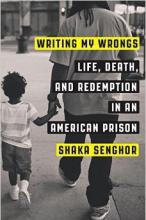
MY SON WAS 10 YEARS, and the sight of an envelope addressed in his squiggly handwriting filled my spirit with joy. But as I tore open the envelope and began reading, I saw that this letter was different from the ones he had sent before.
In the top right-hand corner, Li’l Jay had written in big, capital letters:
MY MOM TOLD ME WHY YOU’RE IN JAIL, BECAUSE OF MURDER! DON’T KILL DAD PLEASE THAT IS A SIN. JESUS WATCHES WHAT YOU DO. PRAY TO HIM.
I stared at the small paragraph for what felt like hours. My body trembled violently, and everything inside of me threatened to break in half. For the first time in my incarceration, I was hit with the truth that my son would grow up to see me as a murderer.
I don’t know why I hadn’t thought about it before. It’s not that I was planning to hide my past from my son—it’s just that I thought I would be able to sit down and explain it to him when I felt he was mature enough for the conversation. But as I read Li’l Jay’s words, reality kicked me in the gut, and the pain of not knowing what to say spread through my body like cancer.
I didn’t know the context of the conversation that he had with his mother, so I wasn’t sure how to respond. The only thing I was sure of was that I had to do everything in my power to turn my life around. It was the only way I could show my son that I was not a monster.
His letter continued:
Dear daddy, I wonder how you’re doing in there. I’m doing fine. When I think about you, it makes me feel sad with no daddy around to wake me up and go work out and be strong like you. I have to do it all by myself. It bothers me the way I miss you. I pray and pray one day my prayer may come true and we’ll be together 4 life. It’s the anger in my heart that hurts me most without a dad in the house. My mama said I am the man of the house. She tells me I have to take over the anger so I won’t be in jail.
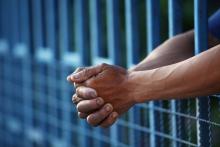
A new study from the Vera Institute of Justice suggests that mass incarceration, typically focused in urban centers, is growing fastest in suburbs and rural areas.
The U.S. already has a massive imprisonment problem — despite having 4 percent of the world’s population, the U.S. has 25 percent of the world’s prisoners. And now, the problem is spreading beyond cities. In 2014, densely-populated counties had 271 inmates in jail per 100,000 people, whereas sparsely-populated counties had 446 inmates per 100,000 people — nearly double the amount.

EARLY ONE SUNDAY MORNING, I drive to the Durham Correctional Center to pick up Greg. He’s spent the past 16 months at a state prison down east, working overtime in the kitchen so he could get out six weeks early. A few days ago, the Department of Corrections transferred him to this local minimum-security facility. Greg knows the place well. He’s walked out of here more times than he can count.
“Feel good to be out?” I ask as we walk through the gate of the chain-link fence, nodding goodbye to the guards. “You know it does,” Greg says, his back straight and his eyes fixed on the horizon. He’s relishing this taste of freedom.
But Greg knows this pleasure is fleeting. As good as it might feel to walk through the gate and hop in a car, leaving prison doesn’t mean you get to leave this part of your life behind.
According to the Prison Policy Initiative, more than 2.4 million Americans are locked behind bars (and 12 million cycle through local jails each year). At any given time, some 6 million Americans are caught up in the criminal justice system—if not behind bars, then checking in with a parole officer who can carry them back to jail for the smallest of transgressions. Like Greg, a disproportionate number of those impacted by the U.S. criminal justice system are African American.
Even if you walk out of the gate like Greg, time served, you still have to deal with the debts that ruined your credit while you were locked away. You still have to rebuild relationships that were cut off because you spent the past decade behind bars. You still have to check the box on almost every job application that says you’re a convicted felon.
I live in a home named Rutba House, where we have opened our doors to friends like Greg who are coming home from prison. Doing so has helped me see that our country’s original sin of race-based slavery has shifted its shape again in the 21st century. As the Black Lives Matter movement has tried to make clear on America’s streets, race still matters. But in light of the fact that African Americans are incarcerated at nearly six times the rate of whites, we cannot understand race in America today without understanding prisons.
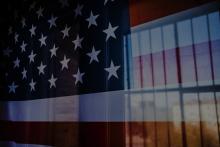
On Oct. 27, 1994 — 21 years ago today — the U.S. Department of Justice reported that the United States’ prison population had reached over 1 million people. By comparison, that’s the same size as San Jose, Calif.— the tenth biggest city in the US.
Today, the United States’ prison population is over 1.5 million — the size of Philadelphia, Pa., our nation’s fifth largest city.
Yet the size of our prison population — the largest in the world — is only part of the problem. Communities of color and poorer communities are disproportionally sentenced to prison — the result of systemic injustices including income inequality, school-to-prison pipelines, and racial profiling.
We mark many positive anniversaries here at Sojourners, but the work of justice also necessitates recognizing ongoing abuses of human dignity over time. So today, on the grim anniversary of 1 million people housed in our prison system, we choose to remember them and all those still behind bars. Here are ten articles we’re re-reading today about mass incarceration — and how to end it.

IN DECEMBER 2011, Eddie Bocanegra, a congregational organizer-in-training, invited me to a meeting held by members of the Illinois-based Community Renewal Society (CRS), a faith-based organization that works with communities to address institutional racism and poverty. I was researching how faith-based organizations facilitated recovery from gang life. However, I was also to learn how formerly incarcerated persons use faith to change their communities.
There were 30 people at the meeting—black, white, and Latino—from diverse Christian backgrounds: Baptist, Catholic, and Eastern Orthodox. First, Bocanegra shared his testimony: The Illinois governor and the United Nations had recognized Bocanegra for his work in violence prevention, but the stigma of his old gang life and criminal record overshadowed his qualifications for employment.
We were asked to think of solutions to “records discrimination.” One person recalled visiting the state capital to lobby for ban-the-box legislation to remove the felony conviction question from employment applications. From that meeting arose a campaign against records discrimination. With the guidance of a CRS organizer, Bocanegra helped found and lead an ex-offender-led civic group called Fighting to Overcome Records and Create Equality (FORCE). Eighteen months later, FORCE earned its first legislative victory: Illinois House Bill 3061, which expanded the list of offenses that can be sealed for employment application background checks.
The National Employment Law Project reports that people like Bocanegra are not alone—65 million Americans have a criminal record. Even for those with low-level convictions, a criminal record carries a stigma and often relegates them to unemployment. While the dominant narrative of re-entry tells us that if the formerly incarcerated obey laws and accept social conditions they will be redeemed as good citizens, this is simply not true. In fact, such “blanket discrimination” against formerly incarcerated persons has a racially disparate impact that violates Title VII of the Civil Rights Act.
The Forgiveness
By Steven
I forgive my dad for walking out on his only son
I forgive the people who think they get over
When they assume that I’m dumb
I forgive life for dealing me this hand
I forgive my inner boy for not becoming a man
I forgive the man who bumped me
Because he couldn’t see
I forgive ...
But I can’t forgive everything
Because I’ve yet to forgive me ...
Steven is an active member of the Free Minds Book Club.
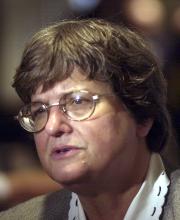
Sister Helen Prejean, the Catholic nun and anti-death penalty activist whose story came to fame with the 1995 film Dead Man Walking, took the stand on May 11 in the penalty phase of convicted Boston Marathon bomber Dzhokhar Tsarnaev’s trial. She said he is “genuinely sorry for what he did,” and told her how he felt about the suffering he caused to the bombing’s victims.
“He said it emphatically,” Prejean said.
“He said no one deserves to suffer like they did.”
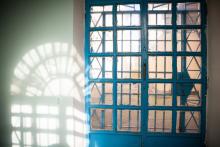
That is also us, the possibility of us, if the wonderful accident of our birth had taken place elsewhere: you could be the refugee, I could be the torturer. To face that truth is also our burden. After all, each of us has been the bystander, the reasonable person who just happens not to hear, not to speak, not to see those people, the invisible ones, those who live on the other side of the border. - Karen Connelly, The Lizard Cage
It was a little over two weeks ago that Marlo entered Atwood Hall here in Lexington federal prison. Nearly all the women here are nonviolent offenders. When I first saw Marlo, her eyes seemed glued to the tiled floors as she shuffled along hallways. I guessed her age to be 25 or so. A few days later, she came to a choir rehearsal. She was still shy, but she looked up and offered a quiet smile when she joined the soprano section. The next time our choir gathered, Marlo raised her hand before we ended our rehearsal. "I got something to say," she said, as she stood. "When I first came here, I can tell all of you now, I was terrified. Just plain terrified. I have 70 months, and I felt so scared." The intake process for this, her introduction to the prison system, had badly frightened her, but before sundown that same day, a second intake process had occurred, with several inmates finding her, reassuring her, and getting her beyond that first panic.
During my four stints in U.S. federal prisons, I've witnessed long-term inmates' unconquerably humane response when a newcomer arrives. An unscripted choreography occurs, and the new prisoner finds that other women will help her through the trauma of adjustment to being locked up for many months or years. Halfway through a 3-month sentence myself, I'm saddened to realize that I'll very likely adapt to an outside world for which these women, and prisoners throughout the U.S. prison system, are often completely invisible.

“But it was an accident! … He said it was a black-skinned boy who sort of looked like my son.”
“It’s all based on circumstantial evidence. It’s not fair!”
“We didn’t have money for a defense attorney!””
All of these assertions are regularly heard in court rooms across the country as the fate of yet another person’s life is determined in a death penalty case. “Gatekeepers of Redemption” – that is what I call them – the decision makers in capital punishment. Yet as I think about the death penalty movement and the shift that seems to be occurring within it, I am beginning to see an inkling of hope.
Years ago, it would not have been far-fetched to state that the main supporters of capital punishment were political conservatives and evangelical Christians. These groups, generally stereotyped as white men and women of the middle to upper class, are more often than not, the same persons with decision-making power with regard to capital punishment, and thus also less likely to fall victim to it.
Nevertheless, times seem to be a-changing and generalizations may soon no longer apply.
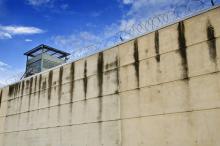
This reading of Isaiah 40 may make it more difficult for many of us to relate to the ancient historical setting of the text. There are many among us, however, who are refugees, forced to migrate to find economic opportunity or even because of poor decisions or systemic injustice that forces a disproportionate amount of our minority population into the prison system. Bereft of personal and economic freedom, our nation’s prison population might find both hope and justice in these words from the ancient prophetic text.
There is no doubt that many in our nation’s prison have committed crimes, just as the ancient people of Judah did according to Isaiah 1. There is also no doubt that we need a system of incarceration that separates dangerous criminals from potential victims. But the words concerning disproportionate judgment also call us to question the fairness of our current system in the United States, which boasts the largest prison population in the world at 2.2 million.
Moreover, just as God did not give up on the people of Judah, God has not given up on those in the prison system. What would happen if we as Christians partnered with God to help transform lives and offer hope to the women and men who fill our prisons?

In some ways, the case of the Muslim prisoner who wants to grow a beard seems easy. When it comes to a prisoner’s religious rights, federal laws favors accommodation when possible.
So how could Gregory Holt — known as Abdul Maalik Muhammad after his conversion to Islam — possibly lose at the Supreme Court, where the justices heard his case on Oct. 7?
Holt wants to grow a mere half-inch beard — a length of whisker allowed in the vast majority of state prison systems, but not the one where he is incarcerated: Arkansas.
Even Chief Justice John Roberts wondered how such a seemingly straightforward case came before the high court, which usually occupies itself with the thorniest of legal questions.
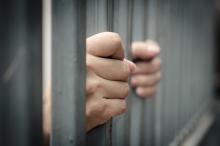
“Capital punishment is against the best judgment of modern criminology and, above all, against the highest expression of love in the nature of God” (Dr. Martin Luther King Jr.)
I despise labels, but I guess you can’t get away from them. For example, I am called an American (a label). I would prefer to be called a United States Citizen because the term “American” is ethnocentristic. The term should mean I am part of the American continents, but it is never used that way. “American” is almost always used to refer to a person who lives in the United States. However, Canadians and Mexicans are also Americans; and so are Hondurans and Brazilians.
I wish I could simply be called “Christian.” But that label necessitates the need for additional labels. Am I Protestant or Catholic? Am I orthodox or neo-orthodox? Am I a fundamentalist, an evangelical, or main-line? Am I emergent, traditional, liberal, progressive, or contemporary? To which denomination do I belong, or am I non-denominational? Maybe I am inter-denominational? Am I charismatic or cessastionist?
It’s maddening!
My preference would be to be called a follower of Jesus. But what does that mean?
Then there are political labels … and they are the worst!
Am I conservative or liberal? Am I a Republican or Democrat or Independent or Libertarian or something else? Am I pro-life or pro-choice? Am I a patriot or and antagonizer? Am I a capitalist, socialist, or communist? Where do I stand on gun rights? What about human rights, or same-sex marriage, or LBGT issues, or immigration, or Obamacare, etc., etc., etc … blah, blah, blah …
Why can’t I just be me?
It’s a lost cause. No matter how hard I try not to be boxed in, people label me. So, let me give you my best shot at who I am based on labels. (Of course, if your definition of the labels is not the same as my definition, then we will have a hard time communicating.) Here goes:

The Supreme Court on Monday declined to hear an appeal from a family seeking asylum in the United States because home schooling is not allowed in their native Germany.
The case involves Uwe and Hannelore Romeike, Christians who believe German schools would have a bad influence on their six children. The family’s case became a rallying point for many American Christians.
As is their custom, the justices on the high court declined to give a reason for not hearing the case.
Michael Farris, chairman of the Home School Legal Defense Association that represents the family, said the group would pursue legislation in Congress to allow the family to stay. But the Romeikes will likely face deportation.

An 84-year-old nun was sentenced to nearly three years in prison on Tuesday for breaking into a Tennessee nuclear facility in July 2012.
Sister Megan Rice and two other anti-nuclear activists were convicted last May of breaking into a federal complex that stores enriched uranium.
“Please have no leniency on me. To remain in prison for the rest of my life would be the greatest honor you could give me,” Rice told the federal judge at her sentencing hearing, according to USA Today.
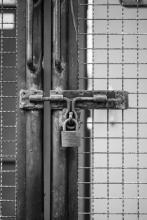
As I stated yesterday, I believe that America’s justice system is broken and in need of desperate repair. One of those areas is the practice of putting our citizens to death, something I believe that all Jesus People should resoundingly oppose.
When I was a conservative evangelical, I was a huge supporter of capital punishment for all of the standard reasons. I even had a quick response when folks correctly brought up the hypocrisy of being against abortion while simultaneously being pro-death penalty, a position I previously argued you can’t hold and still call yourself “pro-life.”
However, when I decided to follow Jesus instead of simply being a Christian who paid him hollow worship while conveniently ignoring the red words, I was forced to abandon my support of the death penalty (and abandon my support of violence in general) as part of Following Jesus 101.
While America’s broken justice system is a complex issue, perhaps the first area we can fix is by abolishing the death penalty in all 50 states. Here’s why I think Jesus People should be leading the charge on this issue: